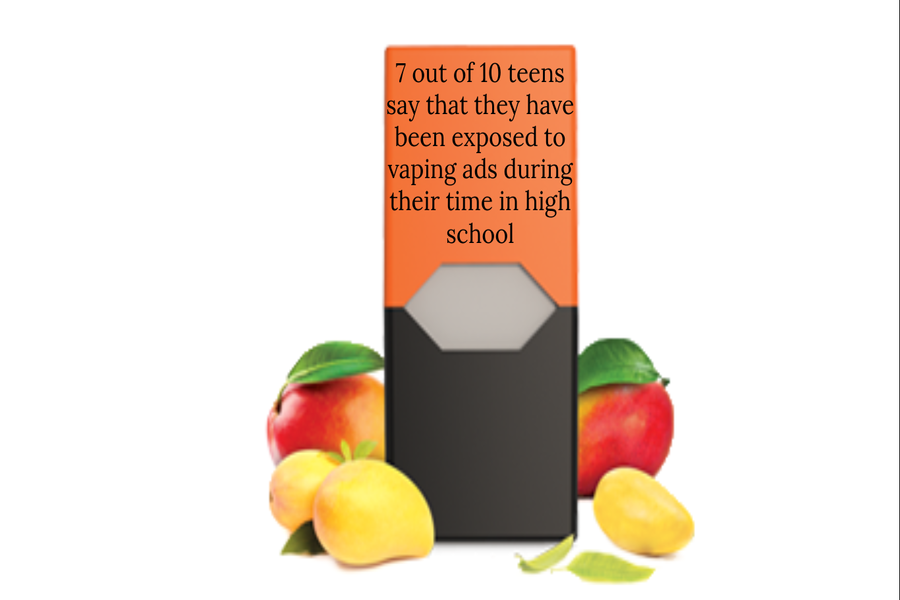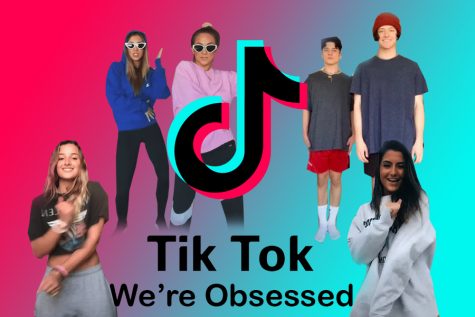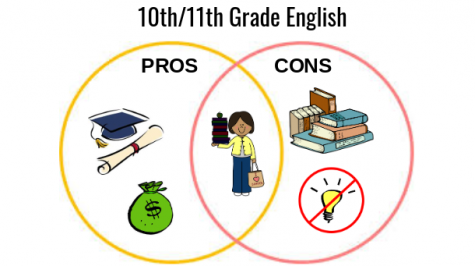Vaping, the deadly truth and what you really need to know
The mango Juul pod is just one of many flavors that attract teens to danger vapinng addiction.
September 26, 2019
In April of 2019 the Maryland State Senate passed a bill to raise the smoking age to 21 in the state in hopes to diminish the link between teens and vaping. The law will go into effect starting October 1. This law will prevent minors from buying e-cigarettes, vapes, Juuls, and other tobacco products, but how much will this law really help to close the gap between minors and vaping?
The CDC (Center of Disease Control), has an ongoing investigation to find the link between the deaths and illnesses related to vaping. There have been more than 380 cases of lung disease reported and all cases have been linked to using vape, e-cigarettes, and Juul products. Seven people have died and the number continues to grow while the investigation continues.
American teens and adults still question whether it’s the actual fruity flavors and “harmless vapor” causing all of these health issues. According to the National Institute on Drug Abuse, 66% of all teens who vape say that it is just flavoring that they are smoking. Clearly, they do not understand the deadly consequences of vaping.
This is a fast growing concern and officials have taken serious measures to protect adolescents from long term health effects. One example of this is that the Charlie Baker Massachusetts Governor Charlie Baker declared a public health emergency and banned all vaping products for four months in response to the multi state outbreak of the vaping related disease.
A federal investigation is ongoing to figure out if there is a link between the lung disease and vaping. All reported cases have admitted to using e-cigarette products, and some patients reported using e-cigarette products with the cannabis product THC, or high levels of the chemical vitamin E. The link appears to be getting stronger between the chemical products and health issues.
It’s no secret that big tobacco companies market to groups that are most vulnerable. They use catchy ads with famous people, pretty women, and even teens to get people to be more interested in their product. According to CDC, women, racial/ethnic groups, and teens are all targeted most for tobacco ads. Tobacco companies make smoking look more appealing in ads, which can increase teens desires to smoke. Women are targeted because tobacco ads make women look more desirable, empowered, and independent if they smoke cigarettes. These companies also target different racial/ethnic groups by showing them that smoking is a part of everyone’s culture.
Years of advertising to the vulnerable public has gotten multiple generations hooked on cigarettes and e-cigarettes. However, big companies such as Nickelodeon have used a similar marketing strategy to warn teens about the dangers of vaping. They have partnered with the anti vaping company Truth to create catchy commercials to get teens attention. One popular commercial takes a twist on the famous animal rights movement. The commercial features animals protesting on trying to stop the testing of Juuls on humans, it’s takes a clever spin on a national movement for animals and makes it about humans. The ads are humorous and get teens attention on a more positive movement.
Juul offers eight different flavors to choose from; cucumber, creme, mint, mango, menthol, fruit, Virginia tobacco and classic tobacco. To a teen, most of these flavors sound very appealing. This does not limit all the flavors of e-cigarettes made. There are hundreds to choose from that sound appealing. Some include sour patch kids, banana creme, cereal, and strawberry.
“Most teens think that it is just harmless water vapor and flavoring. Which could be true in some cases but there are serious long term health issues that most teens don’t worry about when they vape. This makes me feel that vaping is not safer than cigarettes,” said sophomore Allie Kuehner.
Juul products don’t smell or look like cigarettes which makes them very easy to hide from parents and teachers. The popularity among flavors has lead people to try banning different varieties of vape. President Trump proposed to ban of Juul products with the exception of tobacco. This seems to be a good idea, but health officials say that it may not make much of a difference in trying to get teens to stop vaping. Industry experts explained that people have figured out how to flavor their own cartridges with different combinations, or lace cartridges with other drugs.
“Vaping didn’t really blow up until 2-3 years ago in schools. Teachers were totally oblivious to the use of e-cigarette products these past years until more and more kids were caught with them. The school board enhance their efforts to educate teachers about vaping. We actually had a staff training by the school resource officer to educate the teachers about vaping and what to do in those situations,” said health teacher Mr. Chris O’Connor.
These e-cigarette companies like Juul have illegally marketed their product as a “Safer alternative to smoking cigarettes,” and have gained more popularity from their claims, but these claims are misleading. Switching from cigarettes to e-cigarettes is no better for your health, and it could put you at a higher risk for breathing problems. A person trying to quit smoking and switches to e-cigarettes puts them in danger for becoming addicted to both. There is a very low success rate in quitting smoking when trying to switch to vaping. People who try to quit while using patches, gum, or other alternatives were more likely to stop their addiction to cigarettes overall.
“It’s supposed to help people stop smoking, but they made different flavors that are targeted towards children, which, in the future, could make a new generation of smokers,” said the school nurse Leann Windsor.
The FDA has sent a warning letter to Juul saying that their marketing strategy is extremely concerning due to the statements they make to school aged children. The number of youth who uses e-cigarette products has increased significantly, which is concerning. Juul remarks that it had no intention of getting teens and young adults addicted to their product. According to the National Institute on drug abuse, teens who use e-cigarettes are more likely to start smoking, and 30% of those teens switched to regular cigarettes after just 6 months of use. This seems to be causing more harm to teens health than creating a safe alternative to smoking.
E-cigarettes should not be marketed as “safer than cigarettes,” It is untrue and people are developing addictions and health issues. Vaping and e-cigarette products have been marketed to teens for too long. It is time to put a stop to this epidemic. Safer does not equal safe.











